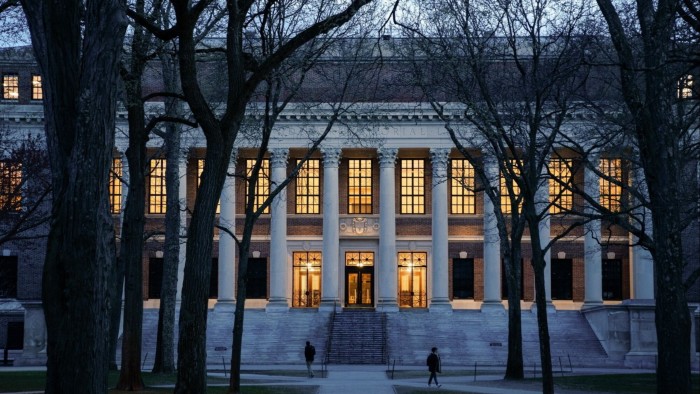Unlock the Editor’s Digest for free
Roula Khalaf, Editor of the FT, selects her favourite stories in this weekly newsletter.
Harvard University’s oldest-standing building, the Massachusetts Hall, was used as an army barracks during the Revolutionary war. Fierce conflict is therefore no novelty. But the onslaught posed by the Trump administration, which threatens financial devastation if Harvard doesn’t make sweeping cultural and administrative changes, requires a different kind of defensive armoury.
While the exact nature of its demands remains fluid, there are three financial advantages the federal government can strip from Harvard: research funding, student aid and tax-exempt status. The first is an easy way to inflict pain; the others would require blunt force and probable legal challenges. The last of the three is particularly damaging, since it might open Harvard up to hefty land charges, and threaten benefactors’ ability to offset donations against their own tax.
Without those, the venerable US university would basically just be a company — one with no shareholders, but a big financial problem. Of Harvard’s $6.5bn of revenue in its 2024 fiscal year, 10 per cent was federal support such as research funding. Harvard’s equivalent of an operating margin averages 2.8 per cent over the past decade. A $53bn endowment is less a cookie jar to be raided than a resource for future students as well as today’s, and is mostly restricted for specific purposes.
There are still ways Harvard might do more with what it has. In business school thinking, it’s a case of revenue up or costs down. The first could involve simply accepting that Harvard will be more like a school for the rich, and pushing up tuition fees, or flogging executive education and online products even harder. While most universities face enormous competition, the Ivy League still has pricing power.
As for costs, those are tougher, but fat could presumably be cut. Some universities already outsource back-office activities — including the massive red tape associated with student aid. Grand Canyon Education, a listed company, handles operational tasks for the university of the same name, which it once owned. While not a massive growth business, the stock has at least kept pace with the S&P 500 over the past five years.
A small handful of colleges eschew government money altogether, for mostly libertarian reasons. Hillsdale College in Michigan is one that argues government involvement in education is unconstitutional. This model perhaps works better for the small: Hillsdale has roughly 1,600 students, compared with Harvard’s 25,000. Its strongly Christian leanings make it a matter of taste. Besides which, it still enjoys tax-exempt status.
Perhaps there’s room for more innovative solutions, should Harvard lose its fight with the government, or fail to find an acceptable compromise. For example: a break-up. Split research activities into a new entity, and it might insulate important, potentially revenue-generating work from other activities, which can then fight their own battle with the White House.
Such things are easy to suggest but hard to execute for a 388-year-old institution. Then again, Harvard can always call up alumni, who after all include the greatest minds in turnarounds and corporate engineering. About a third of graduates go into finance and consulting; perhaps it’s time for them to give back, and not just from their bank accounts.
